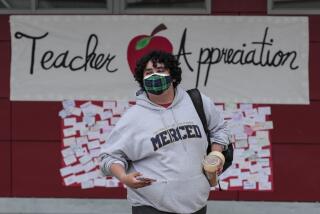2-Income Worker Loses 1, Wins 1 in Summer of Labor Disputes : Jobs: Baseball stoppage idles Mort Rose, a Dodger Stadium peanut vendor. But he probably won’t have to take part in a teachers strike.
- Share via
For weeks Mort Rose had been afraid that it would only take two strikes to get him out.
He had lost the income from his job as a peanut vendor at Dodger Stadium because of the baseball strike.
And until last weekend, he had been afraid that a threatened strike by Los Angeles teachers would cost him the salary from his other job--teaching sixth grade at Selma Street Elementary School in Hollywood.
So he was relieved that a teachers strike was probably averted when the Board of Education approved a new contract offer that would restore 8% of the 10% salary cut that teachers have absorbed for two years.
“At least I don’t have to think about that (a teachers strike) anymore,” said Rose, sighing with relief. “It’s been bad enough with the baseball strike.”
Normally on a day like today Rose would be at work at Dodger Stadium, walking through the stands in his blue-and-white striped shirt and black pants, pitching peanuts into the hands of fans. Instead, he spends his time watching television, feeling depressed about the strike.
“I rely on selling peanuts. I’m one of the top guys,” said Rose, 52, who has been working Dodger games for 35 years. The strike also has been a financial hardship for both his sons, who sell pizza and cotton candy at Dodger Stadium. His oldest attends UCLA, where tuition is $1,300 per quarter.
For 27 years Rose has taught at Selma Elementary, a job that he loves as much as the one at Dodger Stadium. He rarely has to miss a game because most are played in the evenings and on weekends. “Plus, they travel a lot, so it’s not like they’re here all the time,” he said.
Rose had feared that his shaky finances would force him to cross the picket line if teachers went on strike. “I’ve been out on every teachers strike, but with all the money I’ve lost from the Dodgers, I have a big decision,” Rose said before the board made the new offer.
Now, he hopes that the baseball strike will end soon.
“I don’t understand why the owners and players can’t get together,” Rose said. “They’re making millions.”
He figures that if the strike continues to the end of the season, he will lose $3,000.
Rose moved to Los Angeles with his parents from Philadelphia when he was a teen-ager. He sold his first bag of peanuts at the Coliseum during a Dodger game in 1959.
“The first game I worked, they were honoring Roy Campanella,” Rose said. “He had just had the auto accident that disabled him the year before. They lit matches, thousands of them, in his honor. I’ll never forget that.”
He said he usually makes $140 a game, keeping a percentage of the profits. Because he is one of the top sellers, he said, he gets to pick what he wants to sell. Peanuts are the most popular items sold by vendors, Rose said, although on a really hot day he prefers to sell snow cones.
But the most gratifying aspect of being a vendor, he said, is running into former students. “Many times, I get stopped during a game: ‘Mr. Rose, do you remember me?’ Then they’ll introduce me to their children,” Rose said.
“All the kids knew I worked for the Dodgers, and when they see me, they say: ‘You’re still here?’ ”
When Doris Dent came to Selma Avenue as the new principal last fall, she also recognized Rose.
Dent searched through Rose’s file and found a short article printed in a local magazine about a day in the life of a peanut vendor. “Then I realized why he looked so familiar,” she said. “I go to Dodger games frequently.”
Rose is the kind of teacher that children come back to visit years later, Dent said. “He remembers the kids and follows up on them,” she said.
Teachers or staff who want to vent their complaints or frustrations seek out Rose, said teaching assistant Sandy Gagnier. “He’s looked up to when people have problems, or they need an ear,” said Gagnier, who has worked at Selma Avenue Elementary for 18 years.
Venice High School teacher George Woods said he had spoken to Rose during the contract negotiations. “I knew Mort was frustrated, and I understood his concerns,” Woods said.
“Teachers want to have some peace in their life,” said Woods, who is in charge of keeping Westside teachers abreast of developments in the negotiations. “They want a three-year contract, to be able to buy a car or house or pay for their kids’ college education.”
He said he is convinced that most teachers agree with Rose and are satisfied with the compromise. “They’re not happy, “ said Woods, after attending a Monday morning meeting of teachers and union representatives, “but they’re at least willing to accept this.”
At a recent teachers union strategy session, teachers bemoaned the fact that more media coverage was being given to the baseball strike than to their negotiations.
Leaders of the teachers union accepted the district’s one-year contract offer Saturday. Teachers will vote on the offer Sept. 12, the day most schools reopen.
Rose, whose teaching salary is $38,000 (he earned $41,000 before the pay cut), said it used to anger him that baseball players “make more during one game than I do in a year.” It does not bother him anymore.
“I realized that the value of teachers is not understood by the public,” he said. “They don’t realize the importance of the education profession. That’s just the way it is.”
He laughs when asked what made him pick teaching as a career. “It was so many years ago,” Rose said. “But I always enjoyed working with children. I spent one summer as a camp counselor, and after that I decided to try teaching.”
The weight of their new financial strain forced Rose and his wife, Kathy, who works at a Culver City preschool, to scrap plans to vacation at Lake Tahoe and San Francisco this summer.
With no money coming in since the beginning of the baseball strike, Rose said he is considering filing financial aid applications for his son at UCLA. Meanwhile, Rose is looking forward to the new school year, and that first paycheck.
But he really misses baseball--and not only because of the money. “Dodger Stadium is such a nice place to work, and they do a good job of keeping it a nice, family environment,” Rose said. “And I’m a fan too.”






